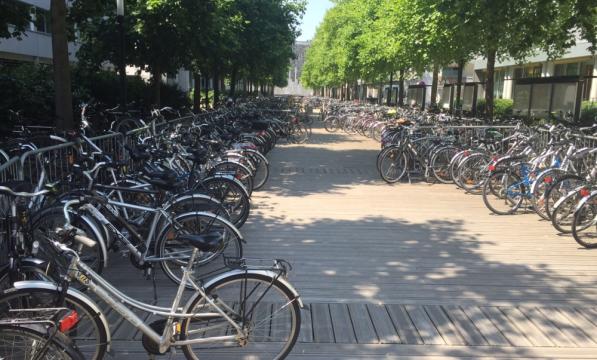Velo-city: it's not all about the bike (or trike)

This year's Velo-city landed on the Loire in France's sixth largest city, Nantes, on 2 June and will be leaving on 5 June. For this short week, Nantes has acted like a migration point for cycling and sustainable transport experts from across the world, and I'm sure that each and every attendee will leave filled with ideas and plans for how they can apply the international lessons they have learned in their own national environment.
Coming from the UK, where the focus on cycling is predominantly about its health and economic benefits, one of the recurring themes at Velo-city is the environmental benefits of cycling. By environment, I do not just mean climate change, but also the physical and urban environment.
Numerous speakers have stressed that we need "to stop talking about bikes" and instead "start talking about people". With a theme of cycling as a "future maker", working out the potential our cities have is a very positive message for decision makers and campaigners. It also helps to address the poisonous classification of people by their chosen means of transport.
Cycling, unsurprisingly but rightly, has been frequently portrayed as part of the solution to creating a more liveable city, not only in terms of more pleasant spaces, but also in terms of reducing congestion. From Taipei to Toronto, the benefits are understood, and bold moves are being made by governments across the world. This was summed up excellently by Swiss geographer and founder of bfluid, Sonia Lavadinho, who called on governments to deliver "realities not projects", because projects only lead nowhere while realities bring change.
Copenhagen's Mayor of Technical and Environmental Affairs, Morten Kabell, shocked many when he stated "Danes love cars too", as he explained that cycling's number one city had its difficulties too. However, while hard to believe, such a statement gives hope for car-centric countries such as the UK; even in the face of a motor obsession, changes can be made.
What is also encouraging is the sense of optimism that oozes from town planners and decision makers. While in the UK our politicians will talk of the lack of funds for cycling due to the economy, this is an excuse which appears to be rejected in many parts of the world. Brazil, Sweden, France, Taiwan, Denmark, Netherlands, Australia ... the list could go on, but each and every country has invested in cycling and reaped the economic rewards as a result.
This makes it all the more frustrating that the UK suffers from a lack of vision, despite the fact that CTC has shown cycling could be worth £248bn by 2050. The sad lack of UK Government representation here has been noted; and with news back home showing that the Department for Transport faces £545m of cuts, it is hoped that they will not further cut their funding for cycling but will rather reduce investment for new roads.
The opportunity of meeting and discussing with international colleagues our successes and failures is a rare and valuable opportunity."
Sam Jones, CTC Campaigner
If I were to express one disappointment with Velo-city, it would be the paucity of discussion on inclusive cycling. A whole host of topics from e-bikes to intermodal systems were under discussion in nearly 40 sessions, but only one was on Inclusive Cycling, which is disappointing. The world's cities, countryside and roads need to be open to everyone - not just those who can take to two wheels.
It would not do to end on a negative note when the conference has been such a success, though. The opportunity to meet and discuss with international colleagues our successes and failures is a rare and valuable opportunity.
Many projects and ideas which might have remained confined within a country's borders have reached international and fertile soil, and I know for one that I am looking forward to applying these to CTC's future campaigning activities when I return at the end of the week!

